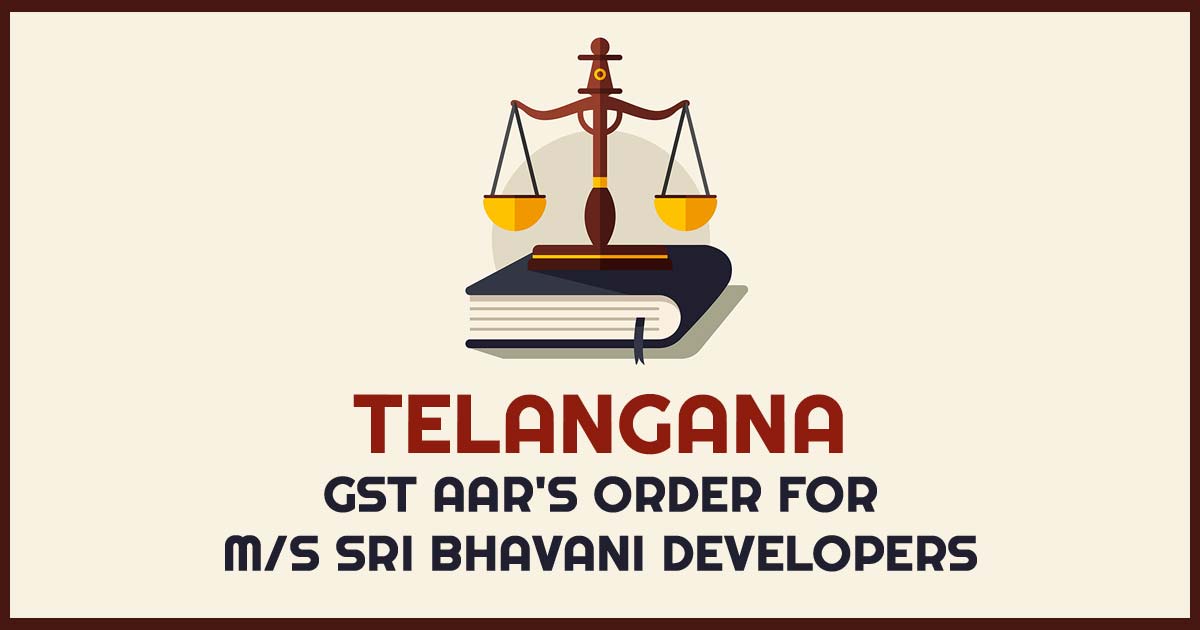
The Telangana Authority of Advance Ruling (AAR) held that the manpower supply or labor supply services by the manpower supply agency come beneath SAC 98519 and would be taxed at an 18% GST rate. The tax would be required to be paid via a manpower supply agency.
The two-member bench of B. Raghu Kiran and S.V. Kasi Visweswara Rao has marked that no GST will be levied for labor engaged on a daily basis or for employees and others when the service would get provided for employment.
The petitioner, M/s Sri Bhavani Developers, is engaged in the construction of residential buildings and has chosen the new tax scheme under the Notification No.3/2019, on 29.03.2019. The petitioner said they entered JDA with one Mr. Sadanda Chary for the construction of residential units at Moulali.
On December 7, 2017, a joint development agreement between the land owner and the builder was signed while a supplementary development agreement on the area sharing basis was signed dated December 17, 2018. They have initiated the work, but they did not have any bookings as of 31-03-2019. Hence, if the petitioner comes into “other than ongoing projects” under notifications No. 3/19 and 4/19, they are left with 5% GST without Input Tax Credit.
Petitioner seeks for advance ruling on the issue of whether notification 4/2019 could comply and GST can be furnished on the grounds of Reverse Charge Mechanism (RCM) for the share of the landlord according to the project comes beneath “other than on-going Projects” since the same could be recognized as a new project.
The petitioner stated, that the customer enters into 2 kinds of agreement during selling the semi-furnished residential flat like “Sale Agreement” and the completion of semi-finished works called “Work Order”. Petitioner seeks for the ruling towards GST rate subjected to be levied on the sale agreement and work order and the ITC eligibility.
AAR sees that notification no 03/2019 creates a difference between an “ongoing project” and an “other than an ongoing project”. The consequence will be “other than ongoing project” directed to the project that starts on or after 1st April 2019. Hence the project which the petitioner undertakes does not come beneath the definition that he claimed.
Read Also: A Complete Guide on Job Work Under GST India
AAR revealed that the petitioner must pay the tax on the constructed part shared with the land owner promoter since his liability is in the capacity of developer-promoter and not as a reverse charge mechanism. The landowner-promoter would claim the tax as an Input tax credit.
AAR specified, that the petitioner would be obligated to file the tax on the reverse charge mechanism beneath several conditions as a developer promoter. The cement must be brought from an enrolled supplier for the project when the total value of supplies obtained from the unregistered suppliers is below 80% and the promoter would be obligated to pay 28% GST beneath reverse charge when the purchase is made via an unregistered supplier. On the part side except for cement, a minimum of 80% of the procurement of inputs and input services utilized to supply the real estate project service will be obtained through the enrolled suppliers.
18% GST would be subjected to be paid on the shortfall. Rather than doing the adjustment project-wise, it will be done in the financial year wise. The third one would be the case of capital goods acquired via an unregistered individual, the promoter would be responsible for filing GST under reverse charge. No GST shall be needed to be paid on the residential apartment on TDR, FSI, or payment of an upfront amount for a long-term lease of land if the supply occurs after April 1, 2019, and the residential apartment is sold prior to finish. But for the residential apartments which remain unsold post to finish, a part of GST would be subjected to be paid on TDS, FSI, or long-term lease of land by a developer-promoter under reverse charge.
AAR ruled that for land and building the initial contract if inserted via distinct unseverable agreements consists of a single contract. Thus the same shall be drawn a 0.5% tax rate for affordable housing and 2.5% for other housing under CGST and SGST, respectively, without ITC. when any additional agreement is above the scope of the initial deal and would have a severable agreement concerning the initial agreement, a 9% tax will be levied on the construction incurred beneath the contract under CGST & SGST respectively with ITC.